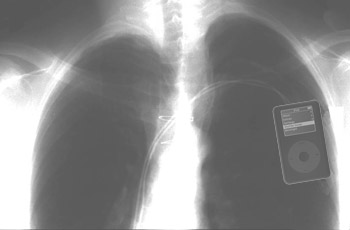|
|

|
Fresh off shelves, Apple iBeat keeps on ticking by Bryan Berge, Contributing Writer
|
  | | Itís my chest, Schwartz! Itís MY chest! |
NEW YORK — With the stunning holiday success of the iPod, Apple's public image couldn't be better. The company is taking this opportunity to expand their product line beyond personal electronics to the human body. Apple expects the iBeat, their "next generation pacemaker," to revitalize an industry dominated by staid biotechs. If the early returns are any indication, they may have found the next market for consumer electronics.
According to PR director Amos Riley, "At Apple, we dare to question. We shattered conventional wisdom with our daring shiny, white, and curved designs. Then we asked ourselves, 'If we can glamorize the techie lifestyle, can we do the same for life and death?' The answer is here. The iBeat will give health technology the kick in the pants it sorely needs. Revolutionary thinking and a commitment to quality set the iBeat apart. Dual G4 processors provide precise performance whether you're reading a book or running a marathon. Hook up your monitor to a computer, and our deluxe software package will display your cardiogram in real time. Add colors and effects and your heartbeat can be your next screensaver! The unit is housed in a stunning shell of shiny, curved white plastic. An exterior light pulses white if all is well and switches to red if the patient's condition worsens. We are confident that the iBeat will take America by storm. iBeat: Walk. Breathe. Live."
The public response so far has been overwhelmingly positive. Intense demand prompted the FDA to approve the device with only focus group data. Feedback from that group called the iBeat "hip" and "stylish" with "terrifyingly spotty performance." Many participants were annoyed that the iBeat was buried under the skin, out of sight. Apple briefly experimented with an external model before settling on the implantation of a transparent plastic window in the skin above the ribs. Through it, an envious neighbor can see the iBeat at work. The updated design received rave reviews, and, despite what Apple called "compatibility issues," the iBeat was readied for sale.
Soon thereafter, Apple began its television and Internet advertising campaign. The first iBeat commercial aired during the "Price is Right" between two Metamucil ads. The animated commercial features red blood cells living it up in a heart that has been transformed into a dance club by the arrival of the glowing-disco-ball iBeat. Since its first airing, the commercial has become one of the most downloaded videos in recent memory.
With the successful ad campaign, demand for the iBeat grew, and publications as diverse as The New England Journal of Medicine and Wired wrote lavish cover stories.
The official unveiling at Apple headquarters was raucous. A diverse crowd, ranging from unconscious patients with IV drips to arrhythmic youths with iPods in tow, stretched around the block to claim their iBeat. Those who could roared when icon Steve Jobs hopped on a platform and, backed by the bouncing beat of Madonna's "Open Your Heart to Me," pulled a sheet off the iBeat's logo and slogan: a white heart shape with a bite out of one side and the punchy phrase "Living with Apple."
Upon receiving their package, which, in addition to the unit and the software, contained a promotional T-shirt and a gift certificate to Apple's online music store, the lucky owners ran or wheeled to mobile surgical units stationed nearby.
One week and three deaths later, sales haven't missed a beat.
The buzz around the iBeat isn't confined to medical circles. The launch T-shirt has been selling on eBay for upwards of $300, and Internet petitions are circulating to pressure the FDA to authorize the iBeat for sale over the counter. While it is currently available by prescription only, that hasn't stopped some hungry consumers.
Doctors report a steep rise in patients with acute chest pain, and prescription fraud is rampant. It seems only a matter of time until the iBeat is powering America's hearts, even the healthy ones.
Amos Riley sees this as the next step. "Why should fashionable technology selectively benefit the sick, those who can enjoy it least? Shouldn't anyone be able to update his or her health? And the applications aren't merely precautionary.
"We envision the iBeat as a supplement, pushing heart rates to the next level. Imagine the boost in energy and productivity! I'm literally aroused by the possibilities."
The profits are likely to be enormous. Apple is actively researching a line of biotech products dubbed "the Essentials." The company released a cryptic trailer on its Web site yesterday, in which black outlines of products in "The Essentials" line float on a white background. Within minutes, guesses flooded message boards and blogs worldwide. Competitors are weighing in as well. Microsoft plans to have coronary "smart" stents on the market as early as next year. |
 |
| ę Back to the February 2005 issue |
 |
|
|

|
|

